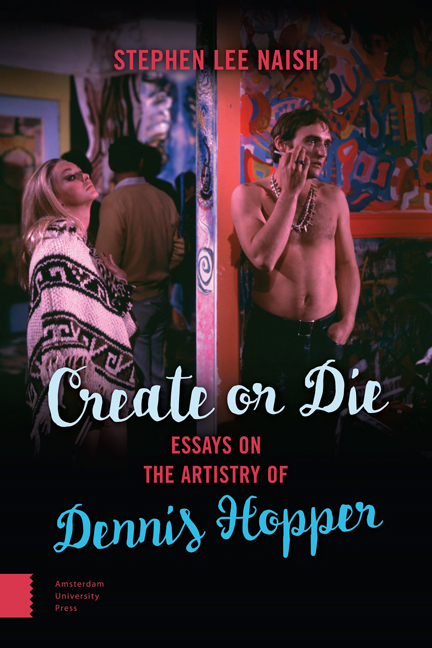Book contents
- Fronmatter
- Dedication
- Contents
- Introduction
- Scenes from a Revolutionary Life: How Dennis Hopper Conquered the American Century
- Hip-Hopp: Dennis Hopper and Music
- The Elephant in the Room: Dennis Hopper and American Politics
- Love and Hate: The Conflict of Emotions in The Blackout and Carried Away
- Commercial Breakdown: Dennis Hopper in the World of Advertisements
- White Light/White Heat: Actor and Character Collide in White Star
- Double Standards: The Art and Photography of Dennis Hopper
- Coda: The Fourth Wall
- Acknowledgements
- Notes
- Bibliography
Coda: The Fourth Wall
Published online by Cambridge University Press: 11 December 2020
- Fronmatter
- Dedication
- Contents
- Introduction
- Scenes from a Revolutionary Life: How Dennis Hopper Conquered the American Century
- Hip-Hopp: Dennis Hopper and Music
- The Elephant in the Room: Dennis Hopper and American Politics
- Love and Hate: The Conflict of Emotions in The Blackout and Carried Away
- Commercial Breakdown: Dennis Hopper in the World of Advertisements
- White Light/White Heat: Actor and Character Collide in White Star
- Double Standards: The Art and Photography of Dennis Hopper
- Coda: The Fourth Wall
- Acknowledgements
- Notes
- Bibliography
Summary
There is a scene nestled within Dennis Hopper's Easy Rider that, at first glance, offers a relatively comedic moment in an otherwise serious film. However, upon further analysis, this scene momentarily destabilises the narrative of Easy Rider, allowing for a brief reflection from the audience. The scene goes as follows: Billy and Wyatt sit around a campfire smoking a real joint of marijuana whilst hillbilly lawyer George Hanson, a little stoned himself after his first inhale of marijuana, explains to them the conspiracy theory that the extraterrestrial Venusian race is infiltrating human society. George boldly states: “they are people just like us, except that their society is more highly evolved. I mean, they don't have no wars, they’ve got no monetary system, they don't have any leaders.” When this theory is called into question by Hopper's character Billy, George continues: “The Venusians have contacted people in all walks of life…all walks of life…” George (or now as the character is broken, Jack Nicholson) then momentarily breaks into hysterics. The scene cuts to Billy and Wyatt's reaction as George regains his composure. Although the scene feels heavily improvised, according to the film's cinematographer Laszlo Kovacs: ”…Jack was in control. He was so stoned, but he was so great. He remembered every word.” Nicholson’s crack-up was kept in the film, possibly to emphasize the corrupting power of drugs on the relatively straight-laced Hanson. However, it briefly throws the audience out of the narrative loop, breaking the imaginary fourth wall that separates actor from spectator in cinema and theatre. Nicholson's character does not address the audience directly, but for a moment the facade of George Hanson drops and Nicholson is revealed. This small but memorable moment begins a career-long practice by Dennis Hopper in breaking down, or in some respects acknowledging, a fourth wall in cinema, yet also an acknowledgement of the fourth wall in the persona of Dennis Hopper.
In an essay entitled “The Easy Rider Paradox”, published in Empty Mirror and included in the book U.ESS.AY: Politics and Humanity in American Film, I argue that throughout his post-Easy Rider career, Dennis Hopper continually and audaciously referenced his most popular and culturally significant film whilst appearing in or directing other films.
- Type
- Chapter
- Information
- Create or DieEssays on the Artistry of Dennis Hopper, pp. 95 - 100Publisher: Amsterdam University PressPrint publication year: 2016



